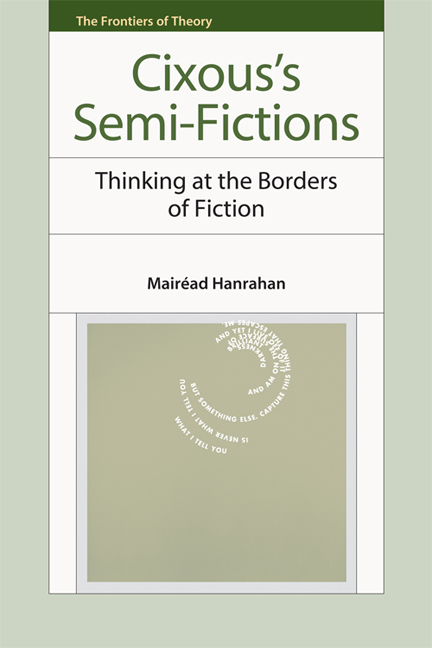Book contents
3 - An Elementary Deconstruction: Les Commencements
Published online by Cambridge University Press: 05 August 2016
Summary
‘J'ai une très grande proximité avec Derrida que je considere depuis toujours comme mon autre’ [‘I have a very great proximity with Derrida whom I have always considered to be my “other”’]: Jacques Derrida has occupied a unique, privileged place for Hèléne Cixous throughout her writing life. It was to him she showed her earliest writings following their initial encounter in the Café Balzar – an encounter which took place after their now legendary ‘non-encounter’ at his Agrégation oral in whose unilaterality (she could see his back; he could not see her) he found the inspiration for his reading of her texts, many decades later, in H. C. Pour la vie, c'est-à-dire … Her first book, the published version of her doctoral thesis, already paid tribute to his thinking. While the body of her thesis makes no reference to him, in a note to an appendix Cixous recognises having ‘surtout’ [especially] made use of ‘la remarquable étude de Jacques Derrida’ [‘Jacques Derrida's remarkable study’] of Plato's Phædrus in ‘La Pharmacie de Platon’ and gives a full bibliographical citation, although the bibliography proper specifies the details of only a small fraction of the more than two thousand works consulted in the course of her research. The two remained in constant exchange until Derrida's death in 2004, reading each other's books as soon as they appeared and talking frequently on the telephone. As Geoffrey Bennington has pointed out, the rhythm of their relationship was similar to that of a psychoanalysis; each appears to have found in the other a source of both wisdom and support. Latterly, beginning with their contributions to the 1990 colloquium Lectures de la différence sexuelle, their friendship flowered very visibly in the extraordinary series of texts they mutually devoted to each other's work. It would be difficult to overemphasise the importance of their intellectual dialogue for the evolution of their thinking, or to overestimate the influence reciprocally exerted by each corpus on the other, ever since that first encounter in the Balzar.
It is thus no surprise that critical reception of Cixous's work has always tended to privilege her proximity to Derrida.
- Type
- Chapter
- Information
- Cixous's Semi-FictionsThinking at the Borders of Fiction, pp. 56 - 93Publisher: Edinburgh University PressPrint publication year: 2014



